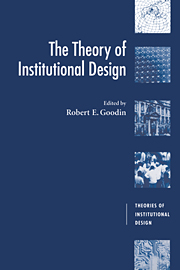Book contents
- Frontmatter
- Contents
- Notes on Contributors
- Preface
- 1 Institutions and Their Design
- 2 Institutional Design and Rational Choice
- 3 Second Best Theories and the Implications for Institutional Design
- 4 The Informal Logic of Institutional Design
- 5 Institutional Morality
- 6 The Publicity Principle
- 7 Designing Institutions in East European Transitions
- 8 Political Deals in Institutional Settings
- 9 Self-inventing Institutions: Institutional Design and the U.K. Welfare State
- 10 Selection and the Currency of Reward
- Name Index
- Subject Index
2 - Institutional Design and Rational Choice
Published online by Cambridge University Press: 05 August 2012
- Frontmatter
- Contents
- Notes on Contributors
- Preface
- 1 Institutions and Their Design
- 2 Institutional Design and Rational Choice
- 3 Second Best Theories and the Implications for Institutional Design
- 4 The Informal Logic of Institutional Design
- 5 Institutional Morality
- 6 The Publicity Principle
- 7 Designing Institutions in East European Transitions
- 8 Political Deals in Institutional Settings
- 9 Self-inventing Institutions: Institutional Design and the U.K. Welfare State
- 10 Selection and the Currency of Reward
- Name Index
- Subject Index
Summary
In this chapter I look at institutional design from the perspective of rational choice theory. I wish to see what principles of institutional design – what principles of broad, social regulation – are supported under the best construal of the rational choice approach.
The project of looking at institutional design from the perspective of rational choice theory will be attractive for those who are disposed to accept the theory. But is it likely to be of any interest for those who reject that theory? I think it is. Rational choice theory is social science by economistic means and, trained as they often are in the discipline of economics, it is very influential among policy theorists and policymakers. For that reason alone it is of interest to see what lessons the theory teaches – or should teach – for institutional design.
There is also a further consideration. It is common for regulatory theorists to represent the claims of rational choice theory as simple-minded and sectarian and to assume that the lessons of the theory for institutional design are more or less straightforward. But it turns out that the rational choice approach represents quite a sophisticated viewpoint on human behavior, at least if it is given a sympathetic rendering, and that it offers a nuanced perspective on institutional design which fits well with many of the insights of more sociological approaches.
The theory gives us reason to countenance some principles of institutional design – spelled out in the final section – which ought to be appealing to theorists from a number of different quarters.
- Type
- Chapter
- Information
- The Theory of Institutional Design , pp. 54 - 89Publisher: Cambridge University PressPrint publication year: 1996
- 33
- Cited by

